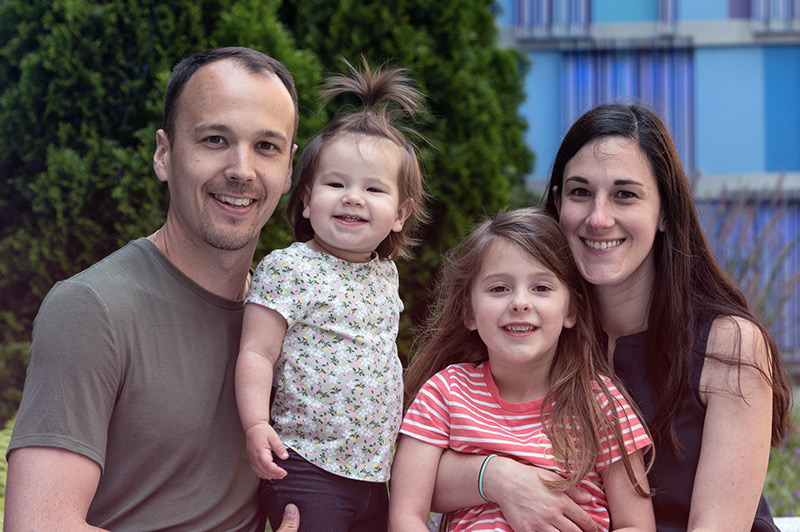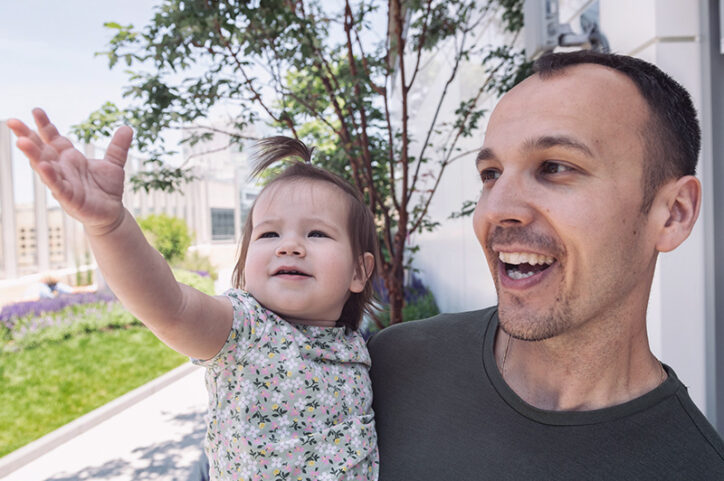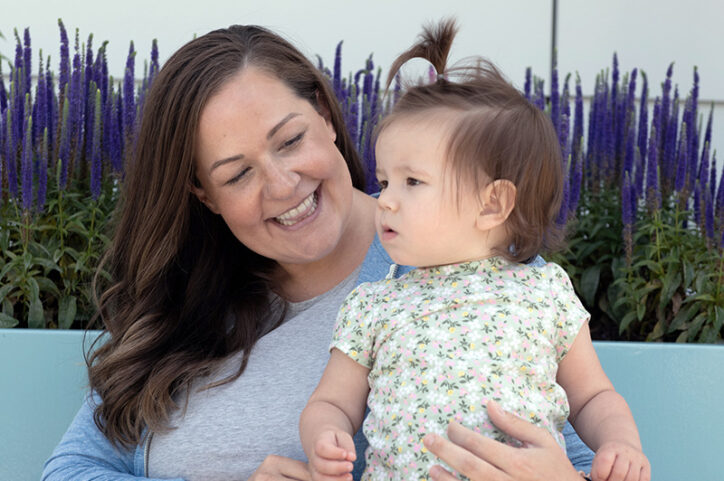Not just another patient: Care for midaortic syndrome that’s ‘handcrafted’ for Iris

This past July, Iris Huot, her older sister, Audrey, and their parents, Jessica and Austin, gathered around their dining room table. To an outsider, it might seem like an ordinary dinner, but for the Huots, it was a moment of perspective — and gratitude.
“It was the first time in eight weeks that we had eaten together as a family,” recalls Austin. “It was one of those small moments in life that you take for granted when your kids are healthy.”
The occasion was a welcome change from months earlier, when Iris became seriously ill for no clear reason.

A fast decline — and no answers
Iris was about 10 weeks old when Jessica noticed that she had suddenly become lethargic. “She was whimpering, grunting, and clearly in distress,” she says. After arriving in the emergency room, Iris was almost immediately transferred to the pediatric intensive care unit (PICU) of her local children’s hospital in Connecticut. There, doctors found that her blood pressure was extremely high — and she was experiencing heart and respiratory failure.
“She was declining fast,” says Jessica. “But no one knew why.”
After nearly three weeks in the PICU and another three as an inpatient, Iris was stable and her heart function had improved. Yet her blood pressure remained high. Concerned, her Connecticut nephrology team reached out to Dr. Deborah Stein, a nephrologist at Boston Children’s Hospital, for insight. The family decided to travel to Boston to see if Dr. Stein could shed any light on their daughter’s condition.

Support for midaortic syndrome
Within just a day of arriving in Boston, Jessica and Austin had an answer: Iris had midaortic syndrome. In this rare and serious condition, the part of the aorta (the heart’s largest blood vessel) that runs through the chest and abdomen becomes narrow. This can decrease blood flow in the chest, abdomen, and lower limbs. Iris also had a related condition called bilateral renal artery stenosis, which occurs when the vessels that carry blood flow to the kidneys become narrowed, leading to increased blood pressure.
Iris spent another week as an inpatient at Boston Children’s, where Dr. Stein — who co-directs the Midaortic Syndrome and Renovascular Hypertension Center — and her team worked together to get her blood pressure under control.
“We really appreciated the synergy between the team members and how they communicated with each other about Iris,” says Austin. “From her onboarding to little things like the hospital food court and rooftop garden — everything about her care felt meaningful and intentional.”

A team approach
While some kids with midaortic syndrome require surgery, Dr. Stein has been able to control Iris’ blood pressure with medication alone. Her team, including nurse Michelle Dowling, also advocates for Iris, helping secure insurance coverage for an at-home blood pressure monitor, for example.
Now 15 months old, Iris loves being outside, playing with her big sister, and eating — especially cheese and blueberries. “She’s a typical toddler: always on the move,” says Jessica. As she enjoys life back in Connecticut, her local cardiologist regularly consults with Dr. Stein about her treatment, and the Boston team remains available to answer questions.
It’s an approach the family appreciates.
“Everything feels handcrafted for Iris,” says Austin. “They see her as a person, not just another patient.”
Learn more about the Midaortic Syndrome and Renovascular Hypertension Center or make an appointment.
Related Posts :
-

For Echo, treatment for midaortic syndrome was ‘MAGIC’
Most 7-year-olds don’t have high blood pressure, let alone blood pressure that hovers around 180/110 mm Hg. (“Normal” blood pressure ...
-

Solving the mystery of Sophie’s high blood pressure
Sophie Lawrence loves “Baby Shark.” Like many other toddlers, she listens to the popular children’s song on repeat, bopping ...
-

Leaning into Sydney: A team approach to renovascular hypertension
In most ways, Sydney Murphy is a typical 3-year-old girl: She watches the movie The Princess and the Frog on ...
-

Matt's story: An innovative approach to midaortic syndrome
Until he was 12-and-a-half, Matt Sarracco had hardly missed a day of school. In fact, he had won awards for ...





